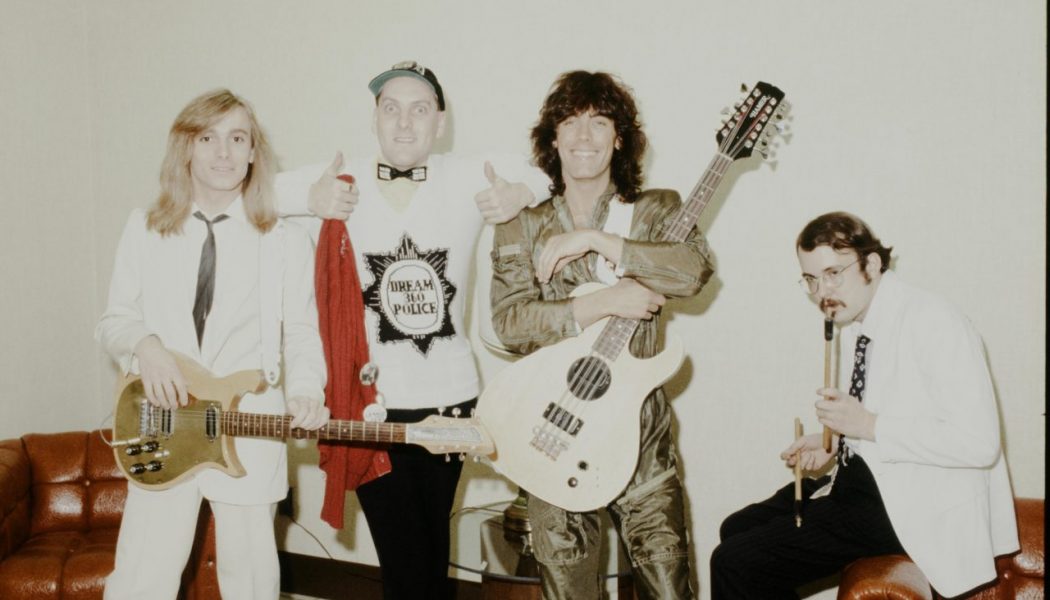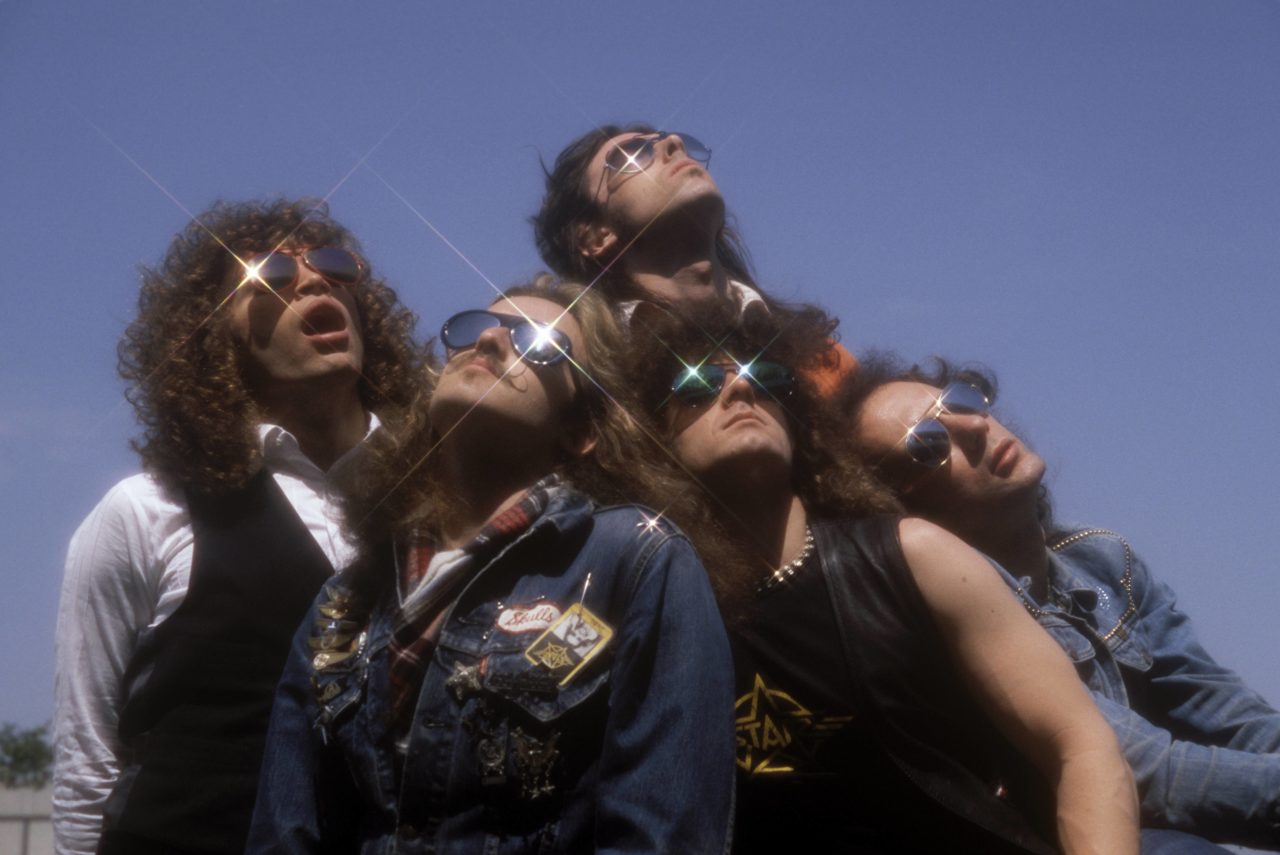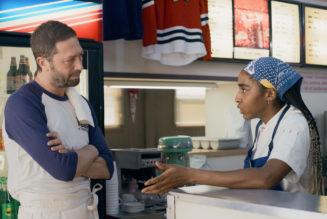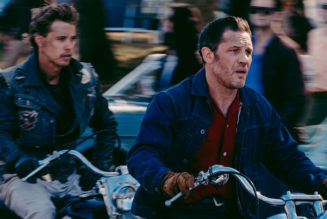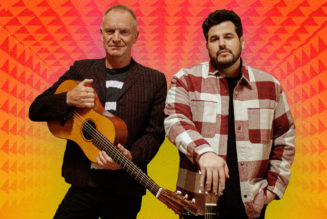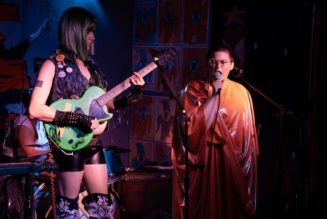Doug Brod has always wanted to write a book about music. It makes sense. He is a former SPIN editor in chief and has worked at Atlantic Records. But Brod wanted to find an angle that “has never been covered before and would actually surprise people and shed new light on something.” He does that splendidly in They Just Seem a Little Weird: How Kiss, Cheap Trick, Aerosmith, and Starz Remade Rock and Roll.
Brod has always been a fan of ‘70s hard rock bands and these four are his favorite ones. “I’ve seen Cheap Trick probably 52 times. I’ve seen KISS a number of times, and Aerosmith and Starz, I’ve seen them a lot.”
After doing some research, he found the connection between these four groups. “All of them are represented in a 1978 Gene Simmons solo album. In ’78, when KISS did four solo albums, Gene had guest guitar work from a member of Starz, Aerosmith, and Cheap Trick. I used that album as the jumping-off point to tell the story of how these four bands connected and interrelated back in the ’70s.”
And that was where we started our conversation about the four weirdest bands from the 1970s.
I love the title of the book. Which of these bands is the weirdest?
That title is a lyric from the Cheap Trick song, “Surrender,” and they’re the weirdest of the bands. Only because their presentation is so unlike what you’d expect from rock stars. You have these two guys — Robin Zander and Tom Petersson — who are the quintessential good-looking rock guys with long hair and cool clothes. Then you have the guitarist Rick Nielson, who’s this skinny goofball in checkerboard clothing and bowtie and a baseball cap. And then you have the drummer Bun E. Carlos, who used to buy his shirts from the Salvation Army. He wore a long, skinny-tie and had greasy black hair and a scraggly mustache and glasses. Those two guys really upended the traditional look of a rock star. And their songs were strange, especially in their early days, about suicide and serial killers. They were so strange.
How did these bands remake rock’n’roll and what was up with rock ‘n’ roll that it needed fixing?
The title can be read in a number of ways. The first is that they remade rock ’n’ roll because the rock ’n’ roll that was before them was not very theatrical. Aside from bands like Alice Cooper in the early and mid ’70s, there weren’t a lot of bands that were onstage doing a theatrical show — pyro, fake blood, flames. Then, in Cheap Trick’s case, you have two goofy guys and two gorgeous guys. In Aerosmith’s case, you have these guys who all look like rock stars with scarves and unitards and the whole rock ’n’ roll swagger. Bands like Led Zeppelin and Black Sabbath were all huge, but they didn’t have that kind of crazy, theatrical performance. These guys all brought that big performance to rock ’n’ roll.
The other way is all of the bands they influenced. Not only did they influence the hair metal guys in the ’80s like Poison, Mötley Crüe, Bon Jovi, but they also influenced a lot of the grunge bands of the late ’80s, early ’90s. Bands like Soundgarden, Nirvana, Alice in Chains, Pearl Jam, all had members that were influenced by these bands. It’s showing how not only did they reshape what rock ’n’ roll could be, but they also reshaped what rock ’n’ roll would sound like in the future.
Is there anyone from the ’80s or ’90s or 21st century that could be that decade’s version of these four bands?
You could look at this band from Norway called Turbonegro, heavily influenced by all of these bands, particularly KISS and Aerosmith. Or Rammstein out of Germany, who are all about heavy pyrotechnics. The music may not be as similar, but the stage show definitely takes from KISS. There’s also the band The Darkness from England who are really flamboyant onstage — they’re huge Aerosmith fans. They bring this sense of fun and a sense of humor to their performance much like Cheap Trick did. And then there’s a kooky band from Ohio called Foxy Shazam. They’re very in your face, a lot of humor.
Who was Starz?
They’re a little-known, cultish band who had ties with all these bands. I wanted to include them in the book because they’re an example of a band that had many of the same opportunities as these other bigger bands, but they didn’t achieve the same kind of success. They had KISS’s manager, they toured with Aerosmith, they had Joe Douglass who produced Aerosmith’s and Cheap Trick’s best albums. They shared many of the same behind-the-scenes people, but they didn’t break out.
What happened?
They just never clicked with radio. And back in the ’70s, radio was key. It really dictated a band’s chances of getting a hit single. They never had a hit single. They had one single that made it to #33 in 1977 called “Cherry Baby,” but that was not enough to take them over the top. There’s also an incident between one of the members of Starz and the manager. Some of the band members think this confrontation may have put the kibosh on a successful career.
Why have the other three bands been able to stay relevant?
KISS, Cheap Trick and Aerosmith became iconic. You look at pictures of them, you know exactly who they are. You can’t say that about a lot of bands today. Band members, for the most part, don’t dress up. There’s not a lot of that kind of personality in music today. Except in the pop scene, you see Miley Cyrus, Cardi B — those people have a look and an image. These bands have so many classic songs that everybody remembers, that still get played constantly on the radio. With Aerosmith’s and KISS’s videos, those images are seared into your head and they have logos that are recognizable from a mile away. I think that’s one of the reasons why they have staying power.
There’s a baby boomer Gen X element to their success now too — people remember them, they have longevity, and that’s why they still play to huge crowds. Who would’ve thought that 20 years ago you’d have musicians going out there 75 years old still playing arenas?
In the case of KISS, they’re still wearing these 6-inch platform heels and playing guitars and singing. I saw Paul Stanley a year and a half ago on wires flying across an arena. They’re fearless. There’s a superhuman quality to that that I think you really have to give these guys props.
Of all the performances you’ve seen of these bands, which is your favorite one?
Seeing KISS for the first time in 1979 at Madison Square Garden. I was 15, it was my second concert, so it was kind of a big deal. It was a spectacular show with all the pyro and the blood and the fire. It was everything that I’d hoped for.
After that, I’d seen them when they took their makeup off and I didn’t really care for it. But I saw them again in 1996 when they came back for a reunion tour with all the makeup and costumes and they were spectacular again. Out of all of the bands, they put on the most spectacular, memorable show.
What is the most interesting story you uncovered?
I’ll tell you a story about Starz. They were the lesser-known of the bands and didn’t get too much respect from a lot of the other bands in the book. They were touring with Aerosmith and had to drive cross-country in their bus to open for them in a huge stadium — I think it was the Seattle Kingdome. They were never the band that went on right before Aerosmith at one of these big festival stadium shows. They were always the first band on the bill and maybe there were two other bands in between. So, they arrive at the venue and they’re told by the promoter that they have to go on a little earlier because he added an act to the bill.
They go on during the daytime and do their half-hour set and then they’re gone. Then the announcer comes out and says, “Now, here’s the juggler.” They had a juggler on a unicycle come out and do this set, and then the next band came on. They were bumped for a juggler. It was very discouraging. That to me encapsulated a lot of ’70s rock ’n’ roll. It shows that these guys worked really hard. They traveled far, some of them really partied hard, but you never knew what obstacles were gonna be thrown your way. At the same time, Starz did have a fanbase, a small but very vocal fanbase — even to this day on Facebook, they’ve got a very strong, small cult of worshippers.
Did these four bands truly live the rock star lifestyle or was that simply an image they tried to uphold?
In the case of KISS, that’s definitely true. With regard to Ace Frehley and Peter Criss, they were hard partiers and that took a toll on their reliability, on their capability and their personalities. It became a big reason why they’re no longer in the band. The same goes for Aerosmith. Steven Tyler and Joe Perry were heavily into drugs, which came out in their performances. Steven Tyler fell off the stage a couple of times, owing to his drug use. In the other bands — in Cheap Trick and in Starz — maybe not as much. Aerosmith finally cleaned up their act in the ’80s and they became even more popular than they were in the ’70s. That story had kind of a nice, happy ending.
People talk about Aerosmith being the best American rock ’n’ roll band because they have to go up against everyone from England. How do you feel about that?
I think that’s close to correct, and that’s part of the book, too. Back then, Led Zeppelin were this monolith and they hovered over everything in that era — they were the biggest band period. But in America, it really was Aerosmith and KISS vying for the title of biggest American rock bands. Today, probably not so much, especially in the ’90s. A band like U2 — one of the greatest stadium bands I’ve ever seen. No band fits the ’70s to me or have been able to do a kind of arena or stadium show as U2 has.
You describe KISS as ‘smart guys writing dumb songs for smart people.’ Just how smart were they and how dumb were their songs?
They were really smart, actually. You could even see it now. Gene Simmons always had an incredible business sense. Even if people poo-poo his efforts for putting KISS’s face and name on every product he can, he recognized that KISS’s fans wanted to buy everything with KISS on it. It became this brand. It only stands to reason that an ambitious guy who was into money would take advantage of that. People like to drag them through the mud for that, but if you don’t want it you don’t have to buy it. And the music is kind of blatant in its pandering. It’s not like it’s this piece of art that can’t be sullied. That’s one reason why I think that it’s okay for KISS to do that.
Their songs being dumb — I mean, most of their songs are about hot chicks and having sex; they sing about their dicks in many songs. They’re obsessed with their genitalia. One thing that a lot of musicians told me is that one of the reasons why they loved KISS so much is that they inspired them because everything was so simple. Their songs are so simple, the lyrics are simple, the riffs are easy, and it showed young musicians that they didn’t need to have the chops of Steve Vai or Eddie Van Halen or Joe Satriani to be a rock musician. They were inspired by the simplicity of KISS, which is one of their strengths. It’s very admirable of them that their songs are so easy to play.
Did the four bands get along?
It’s funny. Early on, KISS and Aerosmith played together twice in ’74 when they were both very young and starting to get some traction. Joe Perry always liked KISS’s stage show; he wasn’t that big of a fan of their music back then, and he said that. Steven Tyler never liked KISS and their road crews never got along. Those two shows they did together in ’74, the road crews were at each other’s throats. Then in 2003 when they decided to tour together doing the co-headline tour that Aerosmith would actually be the last band playing and KISS would play before them, that was also a period when I guess they kind of got along, but there was still some resentment there. Then six years later, both bands were trash-talking each other on the radio going back to that tour. So, there’s always been a love-hate relationship there.
With regard to Cheap Trick, all of these bands love Cheap Trick – guitarist Rick Nielson is kind of a goofball. They’re Joe Perry’s favorite band. No one has a bad word about them. And Cheap Trick loves everybody, too. Starz were the outliers, a lot of the bands didn’t really like them either. They thought that they were too prefab, put together by KISS’s management to be the second KISS. Also, Starz never played bars and clubs. They were made to play arenas and stadiums. They were able to do that right away because they had the KISS machine right behind them. Instead of playing bars for two years and working their way up, they got thrusted to these big gigs opening for much bigger bands immediately. And people and other musicians saw that as, these guys haven’t earned it. That’s up for debate. I think their records are really strong.
What kind of animosity was there between the road crews?
The animosity between the road crews basically came down to KISS’s stage setup. Even in the early years, they were traveling with kind of a mini version of what their show would eventually look like. So, they had almost like a forklift contraption that would be the drum riser that would raise up Peter Criss’ drum set as he was playing. And they had flash pots and pyro and all of this stuff going on. And Aerosmith, frankly, they didn’t want to be upstaged by this new band and they didn’t want to give up too much of their stage to the band. That was where the animosity came from between the road crews: this is our show, and who are you to dictate where all of your mechanical crap is gonna go. And then KISS’s road crew were extremely loyal to KISS and they wouldn’t take no for an answer. I understand that at one of the gigs, knives came out. No one got stabbed, but I think threats were made. That’s one of the reasons why Steven Tyler was like, I’m out, I don’t want anything to do with this band, I don’t need this in my life.
The book is a secret history of classic rock. What do you think is the biggest or most shocking secret of classic rock that we don’t know about?
One thing that was eye-opening to me was how little some of these guys got paid. When Cheap Trick went on their first arena tour opening for KISS, the entire band – their road crew, management — were making a thousand dollars a night. That wasn’t a lot of money back then. Unless you were a big band and you had songs on the radio, you didn’t sell a ton of records. You relied on playing live. Even now, it translates into today, with bands having to tour the country in a van and sleeping on floors. It’s shocking that even back then with these big arena bands who were on major labels, they still were playing for a thousand dollars a night.
